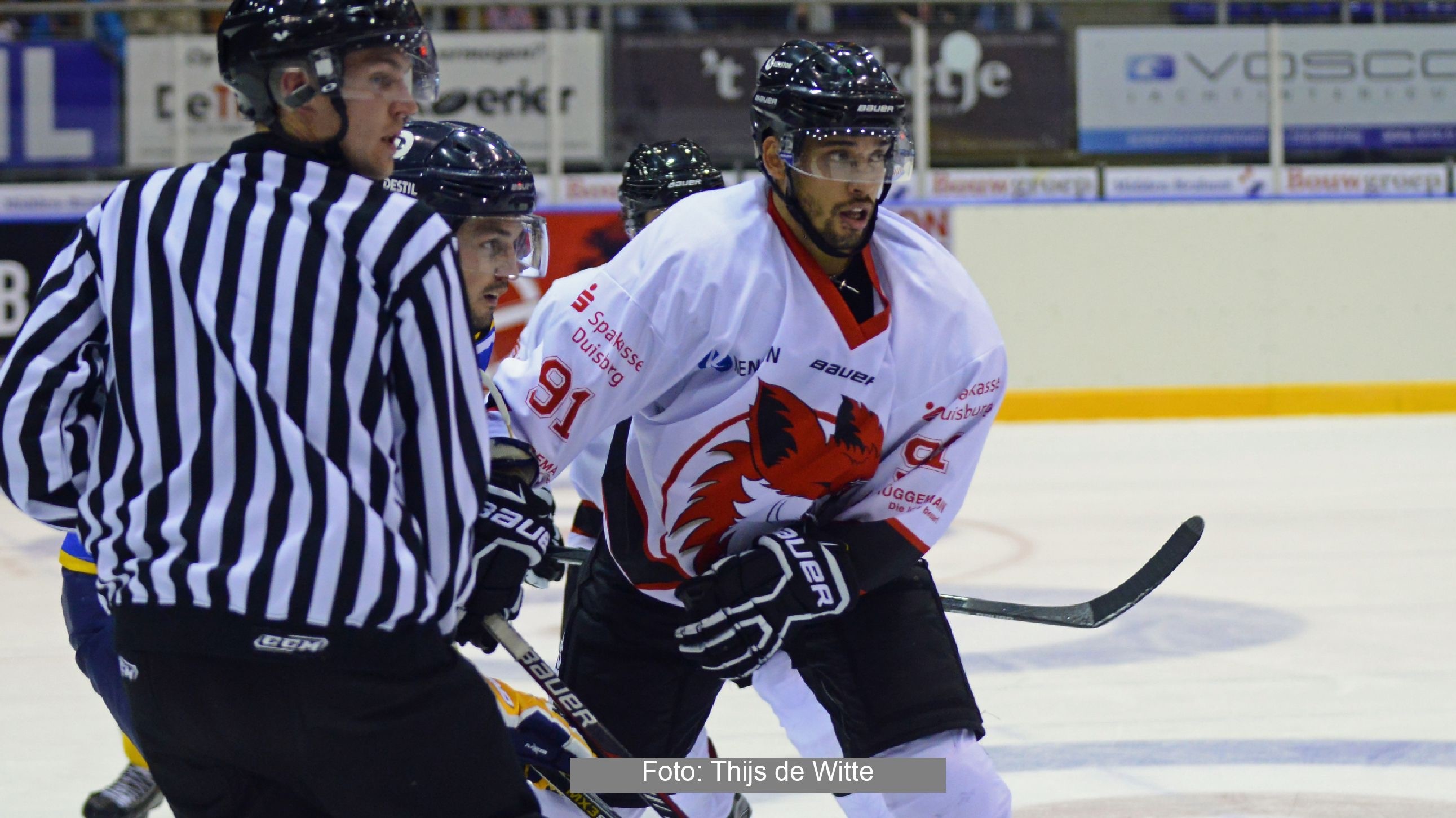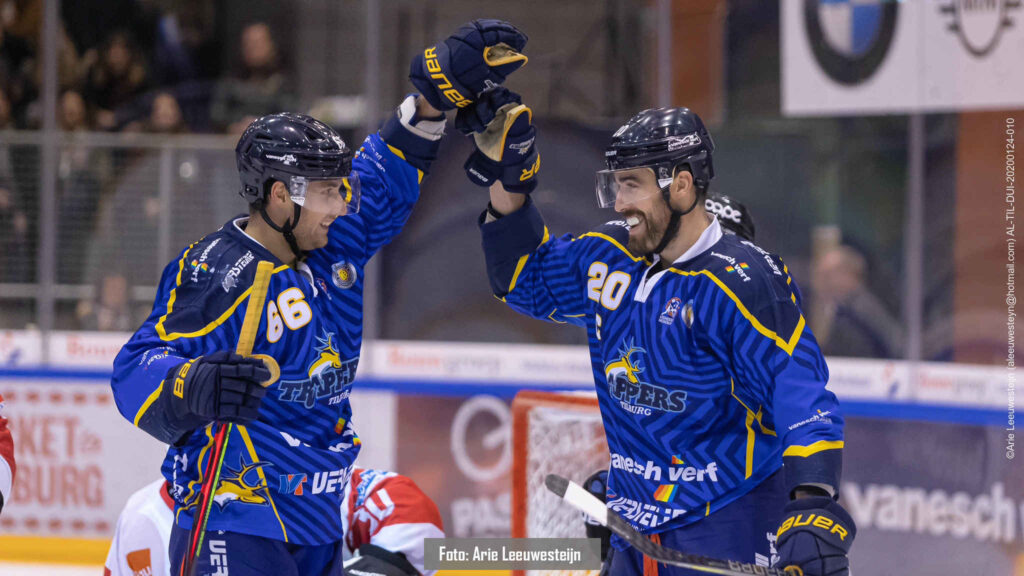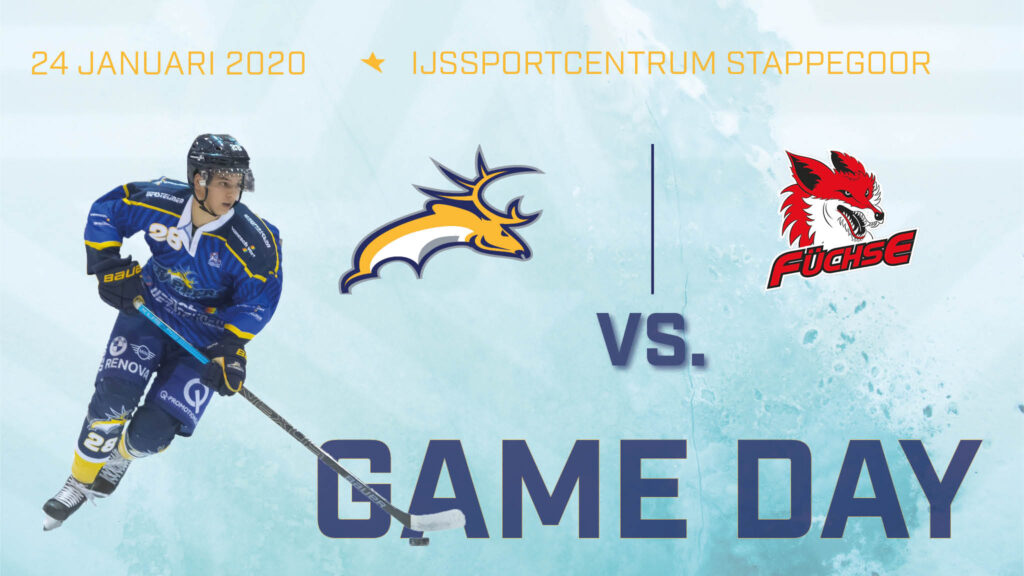Aan het woord: Raphael Joly
RAPHAEL JOLY KROOP DOOR OOG VAN DE NAALD
Plotsklaps veranderde het (ijshockey)leven van Raphael Joly ingrijpend. De artsen vonden in april 2018 cysten in zijn nieren en een ziekenhuisopname van drie weken volgde. De nu 31-jarige assistent-coach van Füchse Duisburg veranderde van het ene op het andere moment van ijshockeyer naar patiënt. ‘The doctors told me I literally could have died on the ice.’
Terug naar zaterdag 28 april 2018, het wereldkampioenschap in Tilburg. Met 3 goals, 8 punten, +7 en een uitverkiezing tot beste speler in het duel tegen IJsland kende Raphael een prima mondiale titelstrijd. ‘Before the game against Belgium Doug (Mason) came up to me and said I didn’t had to play if I didn’t want to’, begint hij zijn verhaal over zijn laatste toernooi als speler. ‘It was my stubbornness probably but I’m not a quitter! I played on painkillers. I told myself, just one more day, Raph…just one more day.’
Terug op zijn hotelkamer werden de klachten echter alleen maar heviger in plaats van minder. ‘I couldn’t sleep that night. I was in a bathtub with hot water on my stomach because it was hurting so much. You can ask Kevin Bruijsten because he was with me in my room.’ Op maandag in het ziekenhuis van Duisburg wordt de ernst van de situatie pas echt duidelijk. ‘I told the doctor I just played the World Ice hockey Championships. You played a whole week with this? There was a blood clot in my left kidney. It blocked my artery. Therefore, there was no blood carried to my kidney. Because I was taking painkillers, it made my blood a little bit thinner. I literally could have died on the ice if the blood clot had gone to my head, lungs or heart.’
EERDERE NIERPROBLEMEN
Joly’s nierproblemen zijn niet van vandaag of gisteren. ‘Two times earlier in my career I had problems with my kidneys. One was in Canada when I was 16 years old. The other when I was in Holland. My kidneys are not filtering the protein enough. Therefore, I am leaking protein when I go to the toilet and stuff like that. When you don’t have enough protein in your body, it causes problems. You get swollen legs, swollen hands. Now I manage to understand the disease and to live with it.
It’s a complicated disease. It’s something they don’t really have a cure for. With some people, it goes away. With other people, it stays the same their whole life. If you take your medication to prevent losing too much protein you can still have a normal life with it. In the end my kidneys will stop working but I’m not thinking of that. I just live my life the way it is right now. What I’ve been through this year was hard. But the situation for other people is much worse.’
TIM KNUDSEN
Joly vertelt zijn verhaal in alle rust. Geboren in Amsterdam, maar op tweejarige leeftijd vertrokken naar het Canadese Gatineau (Quebec). ‘My dad’s Canadian and my mom’s Dutch.’ Altijd in de weer, altijd veeleisend, altijd op jacht naar doelpunten. Zo bewandelde de left winger zijn pad door ijshockeyland. Opgroeiend met zes broers was er altijd competitie en strijd. ‘No matter who I play I always want to win. I played against my cousin in Canada and we had a fight. That’s how I grew up playing hockey.’
Zijn attractieve, harde spelstijl maakte hem razend populair bij zijn eigen supporters, maar gehaat door de fans van de tegenstander. ‘I never liked players that were talking a lot on the ice. I’m not a small dog that barks all the time. I got his number and when he had the puck I delivered a good hit on him or scored a few goals.’ Ter illustratie haalt Raphael herinneringen aan een duel met Nijmegen uit februari 2011 naar boven. ‘We played The Hague and they had a good goalie (Tim Knudsen) that year. I scored a goal on him. He was saying ‘you’re not going to score two’. I said nothing back. Then I got my second goal and he was telling ‘you’re not going to get three.’ I thought fuck, I already scored two and he’s still talking to me. Then I scored a third one. I remember my teammate Adam Krug saying ‘are you going to shut up now. He’s already scored three on you’. I even scored a fourth one. Not saying a word and just doing my job was the best feeling.’
IJSHOCKEYNOMADE
Met 17 punten (8 goals en 9 assists) in 10 onderlinge duels wekte de fysiek sterke forward al snel de interesse van Trappers. ‘I always liked playing in Tilburg. There’s a real hockey tradition. You have a great rink. The fans are passionate and understand the game.’ Toch verliet Joly al na één seizoen de Kruikenstad. ‘I told René I felt bad leaving Tilburg. A lot of fans didn’t understand why I decided to go to The Hague but hockey is still a business. André (Janssen) made me an offer I could not refuse.’
In 2014 verruilde de ijshockeynomade de eredivisie voor de Oberliga toen hij in Duisburg neerstreek. ‘Except from Tilburg for the German teams Duisburg is one of the most professional organizations in the Oberliga. The owner, Ralf Pape, treats everyone very well. All players have hockey as their professional job. We practice in the morning. Go to the gym in the morning. We work a lot with DEL teams. I couldn’t have asked for a better place to play in the Oberliga.’
LIEFHEBBER
Joly vervolgt: ‘Playing hockey felt comfortable. For more than twenty years, I didn’t know anything else. Of course, I wanted my career to end in a different way. To say this is my last year and this is my last game. Last year when I was in Halle, I was still hoping I could play. After Christmas I was more accepting. In the end, your health is the most important thing. I love hockey. It was my passion. But there’s more in life than hockey.’
En dus verwisselde hij bij het begin van deze ijshockeyjaargang zijn stick en ijshockeyschaatsen voor een pak en stropdas. ‘Sometimes things happen for a reason. Now I can start something I love to do. I always wanted to become a coach. When I was 21, I was coaching elite players in Canada. The shitty part of my disease is that I can’t play anymore. The good part is that I still can be part of the game. And I get the chance to do it in Germany. I love Holland too but hockey is bigger here.’
LEGENDES
Als rookie coach viel Raphael met zijn neus in de boter. Zijn eerste schreden in het trainersvak zet de Nederlands-Canadees aan de hand van twee absolute grootheden uit het ijshockey bij onze Oosterburen, Dieter ‘Didi’ Hegen en Uli Egen. ‘Who gets the chance to start his coaching career with these two legends?’ Hegen scored 531 goals in the Bundesliga (only second to Erich Kühnhackl’s 714 goals), won seven German championships and represented his country in five Winter Olympics (1984, 1988, 1992, 1994 and 1998. Uli played 10 seasons in the Bundesliga, coached 8 seasons in DEL and worked in Holland, Italy and Germany.’
Hoe is de rolverdeling tussen het drietal? ‘We kind of doing it all together. On paper, Didi and Uli are the head coaches. They switch up every game. There’s mutual respect. I work a lot with the younger guys, on the powerplay and video analyses.’
GEEN VERSCHIL
Bestaat er een verschil tussen de speler en de coach Raphael Joly? ‘No. There’s an old saying in hockey: ‘play for the name on the front of your jersey, not the name on the back’. In other words, play for your team’s success, not your own. I like the people that are willing to do everything for the team. It doesn’t matter who you are. Everybody has to block shots, everybody has to take a hit once in a while and everyone has to give a hit. You can have so much talent in the team, if you don’t play as a team and don’t work for each other, you never going to win.’
Het is ook daarom dat Joly soms met een schuin oog naar de tegenstander van vanavond en volgende week vrijdag kijkt. ‘In Tilburg it works well because everybody knows each other and they’ve been together for so long. They already have this team feeling. They know most of the guys from the youth program. For me that’s the reason why Tilburg has so much success. They’re not selfish. That’s the mentality I want to bring to Duisburg.’
GRILLIGE PRESTATIECURVE
De nummer acht in de Oberliga Nord kende een grillig prestatiecurve tot nu toe. Uit de eerste vijf speeldagen peurde Duisburg slechts één schamel punt. De Erster Saisondreier werd in Erfurt behaald, gevolgd door zeven winstpartijen. ‘We got too comfortable there. In hockey you can’t get comfortable. There’s always a team that wants to beat you. Teams are hungry to break that streak. That’s why you always have to be ready and prepared.’
De basis voor een goede prestatie leg je in de dagen voorafgaand aan de wedstrijd gaat Joly verder. ‘It all starts in practice. We had a good weekend against Herne and Hannover (Scorpions) last weekend. But that’s the past. Those games are over. We have to start working on Tuesday to be ready for Tilburg on Friday. This is what the guys start to understand. We’re not a team that can sit on our ass and win hockey games. We’re a team that needs everybody to play hard In order to have success.’
VERRASSEN
Het obstakel voor Raphael en zijn manschappen is zoals eerder gememoreerd deze en volgende week vrijdag Tilburg Trappers, de drievoudig Oberliga Meister en huidige koploper in de Oberliga Nord. Het verschil op de ranglijst tussen beide ploegen bedraagt 32 verliespunten. Kan Duisburg de ploeg van coach Bo Subr verrassen? ‘Why not? We’re in the same league as Tilburg. It’s going to be tough. We just have to come in with the right attitude, play as hard as we can and see what happens.’
Toch is de oud-Trapper realistisch. ‘Tilburg is different than any other team in the league. You have to be more alert than against Erfurt for instance. Tilburg plays hockey. They finish their checks. They make backdoor passes. Sometimes their fourth or even fifth man comes in. You need to play a 60-minute game against them. If you only play for two periods you’re going to get burned.’



